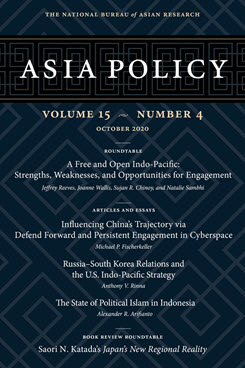India and the Changing Dynamics of the Indo-Pacific
This essay examines issues relating to India’s unique geography, interests, and potential role in the Indo-Pacific region against the backdrop of a rapidly evolving geostrategic environment occasioned by the rise of China as an economic and military power.
EXECUTIVE SUMMARY
MAIN ARGUMENT
The Indo-Pacific reflects two realities. The first is the fact that economic growth and prosperity, which was confined to the Asia-Pacific region following World War II, has now spread across a broader community to envelope Southeast Asia, South Asia, and the littoral nations of the Indian Ocean. The second is China’s effort to foist its supply chains and influence onto the broader region using infrastructure, connectivity, and debt diplomacy as part of its stratagem. A core group of states—the United States, Japan, Australia, and India, all engaged in a dialogue known as the Quad—is propagating an open, transparent, and rules-based order, with emphasis on freedom of navigation and overflight. For many nations, there are now growing alternatives to China’s Belt and Road Initiative. India is the only country in the Quad to face both maritime and land boundary challenges from China.
POLICY IMPLICATIONS
- Though India does not have an alliance partnership with any country, its engagement with the other Quad countries is deepening, including in defense. For India, the disruption caused by China’s forays into the Indian Ocean and South Asia and aggressive actions on its borders will remain its priority.
- China’s unilateralism, especially in the South China Sea, is uniting the opposition; its efforts to evict established stakeholders from the region have resulted in a renewed global commitment to a rules-based order.
- The optimal way forward is for China to acknowledge that multipolarity has a better chance of building enduring structures for peace and prosperity in a post-pandemic world.
Sujan R. Chinoy is Director General of the Manohar Parrikar Institute for Defence Studies and Analyses in New Delhi (India). He was formerly a career diplomat of the Indian Foreign Service from 1981 to 2018, including service as India’s ambassador to Japan, Mexico, and the Republic of the Marshall Islands and high commissioner to Belize. Ambassador Chinoy has over 25 years of experience on East Asia and Asia-Pacific affairs. He has served in Indian missions in Hong Kong and Beijing, as consul general in Shanghai and Sydney, and as India’s representative to the First Committee at the United Nations in New York, dealing with disarmament and international security affairs. He also spent four years on deputation with the National Security Council Secretariat in the Prime Minister’s Office in India.
About Asia Policy
Asia Policy is a peer-reviewed scholarly journal presenting policy-relevant academic research on the Asia-Pacific that draws clear and concise conclusions useful to today’s policymakers. Asia Policy is published quarterly in January, April, July, and October and accepts submissions on a rolling basis. Learn more


